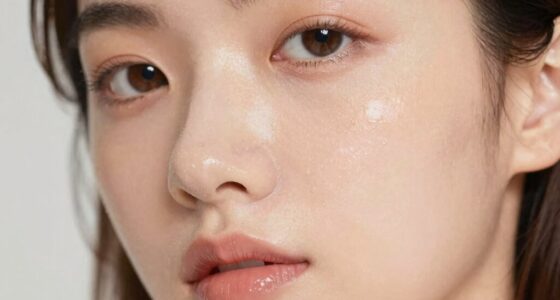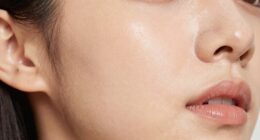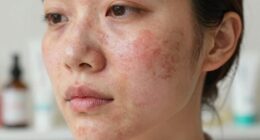During pregnancy, you should avoid skincare ingredients like retinoids, salicylic acid, and harsh chemical exfoliants, as they can harm your developing baby. Stick to gentle, natural remedies and mineral-based sunscreens to protect your skin and guarantee safety. Be cautious with over-the-counter treatments and always consult your healthcare provider before trying new products. Keep your routine mild and nurturing—there’s more safe advice to discover for maintaining healthy skin during this special time.
Key Takeaways
- Avoid retinoids, salicylic acid, and chemical exfoliants to prevent risks to the developing baby.
- Steer clear of harsh, abrasive skincare treatments that can cause irritation or trauma.
- Read product labels carefully to ensure they are free from harmful chemicals and safe for pregnancy.
- Minimize sun exposure and always use mineral-based, zinc oxide or titanium dioxide sunscreens.
- Consult healthcare providers before introducing new skincare products or treatments during pregnancy.

Pregnancy brings about many changes to your body, including your skin, which can become more sensitive, dry, or prone to breakouts. During this time, it’s essential to be cautious about what products and habits you adopt to care for your skin. Some skincare ingredients and treatments that might be safe under normal circumstances could pose risks during pregnancy. To keep your skin healthy without unnecessary worries, you should prioritize natural remedies whenever possible. For example, gentle, plant-based oils like coconut or jojoba can help soothe dry skin, while aloe vera offers a calming effect for irritation. These remedies are generally safe and free from harsh chemicals, making them ideal for pregnancy skincare routines.
Pregnancy skincare should prioritize gentle, natural remedies and sun protection to keep your skin safe and healthy.
Sun protection becomes even more critical during pregnancy. Hormonal changes can increase your skin’s sensitivity, making you more prone to sunburn and pigmentation issues like melasma. Hence, applying a broad-spectrum sunscreen daily is crucial. Choose a mineral-based sunscreen with zinc oxide or titanium dioxide, as these are considered safer for pregnant women and less likely to cause skin irritation than chemical sunscreens. Wearing protective clothing, wide-brimmed hats, and sunglasses adds an extra layer of defense against harmful UV rays, helping prevent dark spots and uneven skin tone that can develop during pregnancy. Remember, avoiding excessive sun exposure not only shields your skin from damage but also helps maintain your overall skin health.
While some skincare ingredients, such as retinoids, salicylic acid, and certain chemical exfoliants, should be avoided during pregnancy, it’s equally important to be mindful of what you apply on your skin. Always read labels carefully and consult with your healthcare provider before introducing new products. Opt for fragrance-free and hypoallergenic options to minimize the risk of irritation. It’s tempting to seek quick fixes for common pregnancy skin issues, but many over-the-counter treatments aren’t safe and could potentially harm your developing baby. Instead, stick to gentle, natural remedies and proven sun protection practices to keep your skin safe and healthy.
In addition, maintain good hydration and a balanced diet rich in vitamins C and E, which support skin health from within. Avoid harsh scrubs or abrasive treatments that might cause trauma or inflammation. Pregnancy is not the time for aggressive skincare routines; instead, embrace a gentle, consistent approach that emphasizes safety and nurturing. By choosing natural remedies, protecting your skin from the sun, and avoiding risky ingredients, you give yourself the best chance to look and feel your best during this special time. Incorporating high-quality skincare technology can also help monitor and improve skin health safely during pregnancy.
Frequently Asked Questions
Are Natural Skincare Products Safer During Pregnancy?
Yes, natural skincare products are generally safer during pregnancy because they contain natural ingredients that are less likely to cause harm. However, you should still check for synthetic preservatives or fragrances that might irritate your skin or affect your baby. Always read labels carefully, and consult your healthcare provider before trying new products. Natural ingredients offer a gentler alternative, but caution is key to ensuring safety for both you and your baby.
Can I Use Essential Oils on My Skin While Pregnant?
You should be cautious with essential oils during pregnancy. While some topical oil applications are safe, others can cause contractions or skin irritation. Always check essential oil safety guidelines and consult your healthcare provider before using any essential oils on your skin. Avoid applying potent oils like clary sage, rosemary, or eucalyptus. Stick to milder options and dilute them properly to reduce risks and guarantee safe, effective skincare during pregnancy.
Is It Safe to Get Chemical Peels During Pregnancy?
Getting chemical peels during pregnancy isn’t recommended because of potential risks to your baby and skin. While chemical peel safety during pregnancy isn’t fully established, many skincare concerns arise from chemicals used. It’s best to avoid these treatments now. Instead, focus on gentle, pregnancy-safe skincare routines. Always consult your healthcare provider before scheduling any cosmetic procedures to make sure they’re safe for both you and your little one.
How Can I Treat Pregnancy-Related Stretch Marks?
To treat pregnancy-related stretch marks, focus on stretch mark prevention through regular moisturizing and gentle massage. Use safe topical treatments like cocoa butter, shea butter, or vitamin E oils to keep your skin hydrated and elastic. While you can’t completely prevent stretch marks, maintaining healthy, well-moisturized skin can minimize their appearance. Remember to always consult your healthcare provider before trying new skincare products during pregnancy.
Are There Any Skincare Ingredients Completely Banned During Pregnancy?
Did you know that over 50 skincare ingredient bans exist globally? During pregnancy, you should avoid certain skincare ingredients like retinoids, salicylic acid in high doses, and some essential oils. Always check for pregnancy-safe ingredients and consult your doctor before trying new products. These skincare ingredient bans are in place to protect your baby’s development, ensuring you only use safe, pregnancy-approved options for your skincare routine.
Conclusion
Remember, taking care of your skin during pregnancy isn’t just a routine—it’s an adventure of epic proportions! With the right tips and precautions, you’ll dodge the biggest skincare pitfalls and emerge glowing like a superstar. Imagine your skin shining brighter than the sun itself, all while avoiding the pitfalls that could turn your glow into a disaster. Stay vigilant, stay fabulous, and let your pregnancy skincare journey be legendary!









